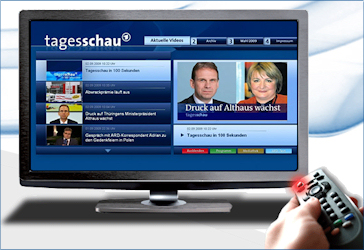
Hybrid Broadcast Broadband (HBB) is the name for popular interactive broadcast services that combine linear broadcasts with on demand content delivered over the internet. The EBU is one of the founders of the HbbTV Association that developed HbbTV. Today approximately 93% of the connected televisions for sale support HbbTV and HbbTV services are being deployed by broadcasters throughout Europe. Audience research shows that users appreciate HbbTV, not just to access on-demand video, but also to find out more about a specific programme or even to browse through the extended EPG-like data. In Spain RTVE now reaches more than 700.000 homes with their 90.000 hours of HbbTV offerings, which were soft-launched only eight months ago. In HbbTV pioneer Germany, in which HbbTV services have been available already since 2009, the ZDF HbbTV platform now generates over 2.5 million views per day. 10 million HbbTV enabled televisions have already been sold in that country.
Best of both worlds
HbbTV services are popular because they combine the best of two worlds. Traditional broadcast techniques are very efficient for delivering vast amounts of popular content to large audiences, while the internet is an ideal return channel to facilitate interactivity and on demand services. When tuned in to a channel the end-user simply can push the red button to enter an HbbTV portal.
But maybe the biggest reason why HbbTV is successful is money. The HbbTV standard uses simplified profiles of popular internet standards, making it easy to deploy. Experience shows that the costs for application development of an HbbTV service are 50 times lower (!) than that what a broadcaster needs to pay for mobile video applications. Due to the high degree of standardisation support costs less too.

HbbTV application example (image: HbbTV.org)
The success of HbbTV shows that the EBU needs to continue to invest in standardisation efforts that allow broadcasters to run their own cost efficient services and stay in direct contact with their audience in the future. Currently the EBU is focusing on HbbTV v2, which is being developed in close cooperation with the industry. It will enable the use of new popular browser technology (HTML5), an improved streaming format (DASH) and pairing with second screens. These extensions will guarantee the growing popularity of the standard in the future. HbbTV 2.0 is expected to be finalized later this year, and to appear in products soon after.
